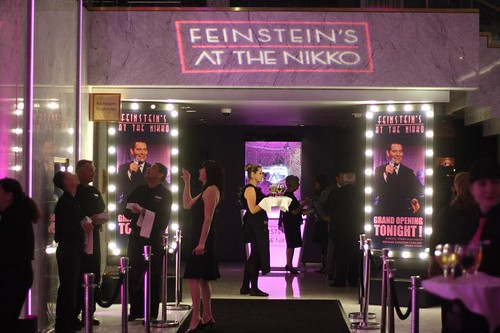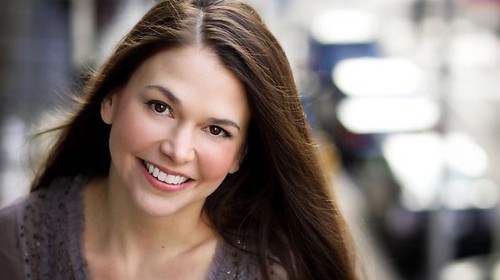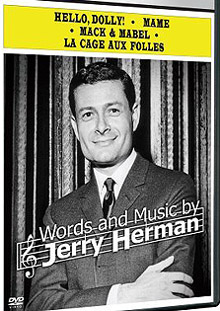San Francisco Bay Area cabaret lovers drooped a little when The Rrazz Room, after attempting to make a go of it after departing the Hotel Nikko, finally packed up and headed out of town earlier this year.
But as Maria von Trapp is fond of saying, “When the Lord closes a door, somewhere He opens a window.” In this, case credit is due not so much the Lord (apologies) but to Michael Feinstein, one of this country’s greatest natural resources and practically a one-man juggernaut in celebration (and preservation) of the Great American Songbook.
Consider what this man is doing these days: he constantly criss-crosses the country performing in concert with symphonies and makes audiences very happy. He’s spearheading the The Michael Feinstein Great American Songbook Initiative, which is based out of the Center for Performing Arts in Carmel, Indiana. He just broadcast the third season of “Michael Feinstein’s Great American Songbook,” a fascinating series on PBS. He just published the book The Gershwins and Me (well worth a read, and the CD tucked into the back cover is sublime, with Feinstein singing and Cyrus Chestnut playing 12 Gershwin tunes).
He closed his New York nightclub at the Loew’s Regency last New Year’s Eve after 14 years (there are rumored plans of opening another Manhattan club), but at the end of April, there he was on stage for two private concerts in the former Rrazz Room space launching Feinstein’s at the Nikko.
San Francisco is where the young Feinstein cut his cabaret teeth – at the dear, departed Plush Room, to be exact. And it’s thrilling to have Feinstein back. He’s got an upcoming gig with the San Francisco Symphony on July 12 (info here) pegging to his Gershwin book, and after that he says we can expect him back regularly at Feinstein’s at the Nikko.
To officially open the room to the public, Feinstein and his team made a shrewd choice in two-time Tony Award-winner Sutton Foster. She’s a classic ingenue in the great Broadway tradition yet she’s contemporary (a moment to give a shout out to “Bunheads,” Foster’s sublime TV series on ABC Family – can we PLEASE have a second season of this sweet and witty series? Please?). To my mind, she’s a Mary Tyler Moore for the 21st century, with a little Ethel Merman and Julie Andrews thrown in for good measure.
Foster’s 70-minute show is pure delight. Her dress selection shows off her incredible legs, and her song selection demonstrates that she’s more than just a pretty (and pretty big) voice.
She pays homage to her Broadway roots in medley of songs from her shows Thoroughly Modern Millie, Annie and Little Women that bursts with optimism, then toward the end of the set she reveals a little more world weariness with a Sondheim blend of “Anyone Can Whistle” and “Being Alive.”
Musical director/arranger/accompanist Michael Rafter supports Foster with sensitive playing throughout her polished standards (“Nice and Easy,” “The Nearness of You,” “Warm All Over,” “I Get a Kick Out of You”) and on some of the more dramatic story songs such as Francesca Blumenthal’s “The Lies of Handsome Men” and Rupert Holmes’ “The People That You Never Get to Love.”
Foster shows off assured comic timing in Christine Lavin’s “Air Conditioner,” in which an overheated Manhattan dame is willing to throw down for anyone with AC.
The show’s sweetest moment wasn’t in “Sunshine on My Shoulders,” which was a little too sweet for my taste but rather in a medley of “It Only Takes a Moment” and “Time After Time.” Foster performed the song, without the aid of a microphone (like she ever really needs a microphone) to her adorable little dog Linus, who was sitting comfortably in her lap.
Though Foster doesn’t spend a lot of time on patter, and when she sings, she mostly directs her attention straight ahead and doesn’t really play the room, she oozes charm and cheerful good will. She sells Nat “King” Cole’s “It’s Crazy But I’m in Love” and Harry Nilsson’s “Good Old Desk” with a quiet voice that is the aural equivalent of a smile.
But on several songs, which she makes inextricably her own, we get more depth from this 38-year-old performer. “My Heart Was Set on You” by Jeff Blumenkrantz is heartbreaking, and James Taylor’s “You Can Close Your Eyes” is a wistful way to say goodnight to the audience (before storming back with a microphone-free “Anything Goes”).
FOR MORE INFORMATION
Sutton Foster continues through July 12 at Feinstein’s at the Nikko, 222 Mason St., San Francisco. Tickets are $75-$95 (note: ticket price includes a $30 food and beverage credit). Call (415) 394-1111 or visit www.hotelnikkosf.com for information.




 The Jewish Community Center of San Francisco is also part of the Bernstein celebration with a screening of the PBS documentary Reaching for the Note, which delves into Bernstein’s musical and personal life. The screening is free at 7 p.m. Nov. 20 but reservations are required.
The Jewish Community Center of San Francisco is also part of the Bernstein celebration with a screening of the PBS documentary Reaching for the Note, which delves into Bernstein’s musical and personal life. The screening is free at 7 p.m. Nov. 20 but reservations are required.
 Also in the series is JCCSF’s benefit event: 100% Michael Feinstein – Bernstein and Friends on Nov. 23 with cocktails at 5 p.m. and the concert at 7 p.m. when Feinstein reprises his Carnegie Hall tribute to his friend and mentor.
Also in the series is JCCSF’s benefit event: 100% Michael Feinstein – Bernstein and Friends on Nov. 23 with cocktails at 5 p.m. and the concert at 7 p.m. when Feinstein reprises his Carnegie Hall tribute to his friend and mentor.
 Saw a fantastic documentary last night that I highly recommend: Word and Music by Jerry Herman. It was on PBS for about a second, but it’s available via
Saw a fantastic documentary last night that I highly recommend: Word and Music by Jerry Herman. It was on PBS for about a second, but it’s available via 


 “I was having a whale of a time then,” Feinstein recalls. “It was a great, magical room for connecting with audiences. I have so many memories from there. Sammy Cahn came in one night. Milton Berle came in and ended up doing 20 minutes. Irene Manning of Yankee Doodle Dandy came in. Herb Caen wrote about me, `The kid’s got it,’ and it was like being anointed by the Pope. All the intelligentsia, the movers, shakes and money of San Francisco were there.”
“I was having a whale of a time then,” Feinstein recalls. “It was a great, magical room for connecting with audiences. I have so many memories from there. Sammy Cahn came in one night. Milton Berle came in and ended up doing 20 minutes. Irene Manning of Yankee Doodle Dandy came in. Herb Caen wrote about me, `The kid’s got it,’ and it was like being anointed by the Pope. All the intelligentsia, the movers, shakes and money of San Francisco were there.” “There’s no money in preservation,” Feinstein says, which is why he created a foundation to spearhead a national effort. “If it’s not The Wizard of Oz and not deemed viable to turn a profit, nobody’s interested.”
“There’s no money in preservation,” Feinstein says, which is why he created a foundation to spearhead a national effort. “If it’s not The Wizard of Oz and not deemed viable to turn a profit, nobody’s interested.”